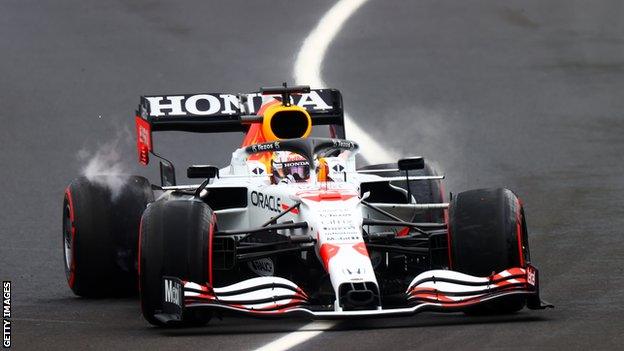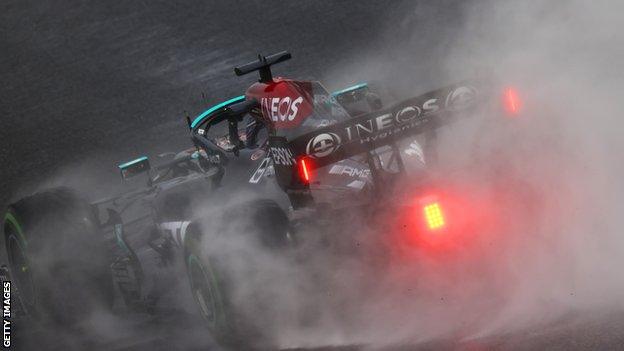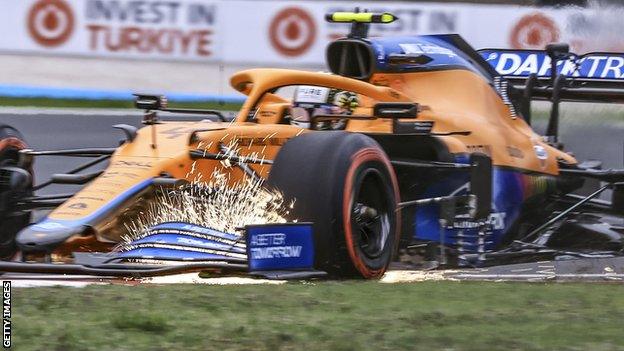Turkish Grand Prix: Intriguing clues to where the power lies
- Published

The Turkish Grand Prix is live on 5 Live and the BBC Sport website
So far, Lewis Hamilton's damage-limitation exercise at the Turkish Grand Prix is going to plan.
Mercedes realised going into the weekend that Hamilton's title rival Max Verstappen was likely to reclaim the championship lead on Sunday.
The Dutchman starts the race only two points adrift and Hamilton has a 10-place grid penalty for using too many engine parts.
But Mercedes needed to find a way to prevent the Red Bull driver from making up too much ground on Hamilton. So they had two main ambitions for Saturday's qualifying session.
The first was for Hamilton to qualify fastest, to guarantee the best possible starting position for the race. The second was for team-mate Valtteri Bottas to be second so the Finn would start from pole following Hamilton's demotion, giving him the best chance to prevent Verstappen from winning.
Saturday, then, was mission accomplished - the seven-time champion pipping Bottas by 0.13 seconds in qualifying, with Verstappen 0.328secs off the pace in third.
Even better for Hamilton is that Verstappen and Red Bull have not managed to get their car in a satisfactory place in terms of handling balance and the Mercedes has had a comfortable pace advantage throughout practice and qualifying at Istanbul Park.
Verstappen also admitted his concerns about starting on the inside of the grid, where grip is considerably poorer than on the racing line, theoretically reducing his chances of beating Bottas into the first corner.
How might the race develop?
On paper, in the context of the championship standings, there are two races on Sunday, with interlinked consequences.
The first is for the win, between Bottas and Verstappen, although Charles Leclerc's Ferrari may cause some trouble if he can get off the line well from his third place on the grid.
The second is between Hamilton and the rest of the field, in terms of how much progress the Briton can make towards the front by the end of the race.
After qualifying, Hamilton was giving mixed messages about his expectations and ambitions for Sunday afternoon.
With his realistic head on, the 36-year-old said he imagined it would be "difficult to move up". But at the same time, Hamilton was not ruling anything out.
His approach, he said, would be "partly cautious but also super-attacking - I want to win the race somehow, so that's my goal."
A realistic Hamilton referred people back to the last race in Russia, where Verstappen served his own engine-related grid penalty.
There, starting from the back, the 24-year-old made rapid progress until he encountered the quicker midfield runners, who proved impossible to overtake until a downpour in the closing laps.
It was only making the right decisions, over when to stop for tyres in the late-race rain, that allowed Verstappen to convert a likely seventh place into second behind Hamilton.
For Verstappen, then, his damage-limitation race in Russia went as well as he could have hoped.

Hamilton has won five races this season so far
No obvious strategy advantages
Hamilton's hopes on Sunday are complicated by the fact that all but one driver in the top 10 in front of him will be starting on the same 'medium' compound tyres as he is.
Usually, the front group would be split, with the Mercedes and Red Bulls quick enough to progress through second qualifying - which defines a driver's starting tyre - on the optimum race tyre, but the others forced to use the softest option.
This weekend, though, the soft is so poor that only Alpha Tauri's Yuki Tsunoda in 10th will start ahead of Hamilton on it.
This makes it harder for Hamilton to make progress because the others in front will be seeing their tyres go off only as quickly as he does, rather than faster, as would have been the case if they were on the softer tyres. He will have a pace advantage over them, but will it be enough to be able to overtake them?
Mercedes F1 boss Toto Wolff said: "It would have been easier if we had a tyre offset strategy, but [trying to get through second qualifying on] the hards would have been little bit too bold.
"We expected that some of the other guys in front of us would run the soft to make sure they were in Q2, but that didn't happen, which is a little bit of a setback.
"He can only try to do the utmost. I wouldn't want to have any other driver in the car when it is about overtaking and going through the field than Lewis. Having said that, yesterday we simulated some of the situations and it's very difficult to follow in traffic.
"There will be not many options left than to try with strategy and to hope the front train is not disappearing into the distance."
Bottas at the front, Wolff said, "is going to race his race". "This is about the race win and we are not going to do any bunching up," he added.
Verstappen, though, suspects he and Hamilton will meet in the course of the race.
"They have a lot of pace the whole weekend," Verstappen said, "so I definitely expect him to be behind me at some point."
And he added he thought the chances of Hamilton ending the race on the podium were "very good".

Briton's Lando Norris came close to victory in the previous race and remains fourth in the drivers' title
Two potentially key developments
However the race pans out, the weekend has revealed some other interesting facets of the closest title battle between drivers from two different teams for a decade or more.
This is the second race in succession in which one of the contenders has suffered a grid penalty for taking more engine parts than permitted. But the circumstances of the penalties for the two drivers are different.
Verstappen's penalty arose from the fact he lost one of his Honda engines in the first-lap crash with Hamilton at Silverstone. Hamilton's is because Mercedes are managing reliability concerns.
"When you start to push the boundaries with power-unit performance, at a certain stage you will experience some obstacles," said Wolff.
"Our power-units have been the most reliable since the introduction of the hybrid engines in 2014 and, because the boundaries are being pushed we have seen examples of, let's say, unusual noises within the combustion engine that aren't completely understood yet.
"They caused some troubles in the past. We had some engines that basically failed and now it's about containing the problem because changing parts is not something you would tackle."
In that context, can they get to the end of the season without another problem?
Meanwhile, there is the merest beginnings of what looks like an impression that Mercedes may be starting to eke out a narrow performance advantage over Red Bull.
Over the first half of the season, Red Bull had a narrow edge over Mercedes. Up to the summer break, their average ultimate pace advantage in dry qualifying sessions was 0.014 seconds. But since the teams reconvened, Mercedes have the advantage - at 0.234secs.
Now, it's important to add a caveat to that. There have been only three dry qualifying sessions in the second half of the season and one of them was at Monza, a track where Mercedes were expected to be comfortably ahead. The sample is small and may be unrepresentative as a result.
Nevertheless, Wolff did admit that Mercedes were beginning to make progress with their car, after a difficult start to the season following rule changes over the winter that seemed to affect them more than Red Bull.
"We have gradually understood the car better," Wolff added. "The regulations that came in at the beginning of the year created a situation where you need to run the car where we haven't been running in the last few years. The more we run it, the more we drive, the more we would simulate situations, the better we have performed.
"Today we would have been first and second with a good margin, with a solid margin.
"Unfortunately, Lewis has to go back. But the nice part is that we have pace and there are six plus one races to go, and where the car is today is definitely in a much better place than in the spring and summer."
It's early days, and there is still a third of the season to go, with at least one race - Mexico in early November - where Mercedes think they have next to no chance of competing with Red Bull.
But if this trend continues over the coming events, it may shift the general impression that Verstappen remains a narrow favourite for the title. Even if, as seems likely, he reclaims the championship lead on Sunday.
One to keep an eye on, in any case.

Ridley Road: Caught between life and death in the swinging '60s
The Nuremberg Trials: The remarkable aftermath of the verdict on Nazi war criminals

